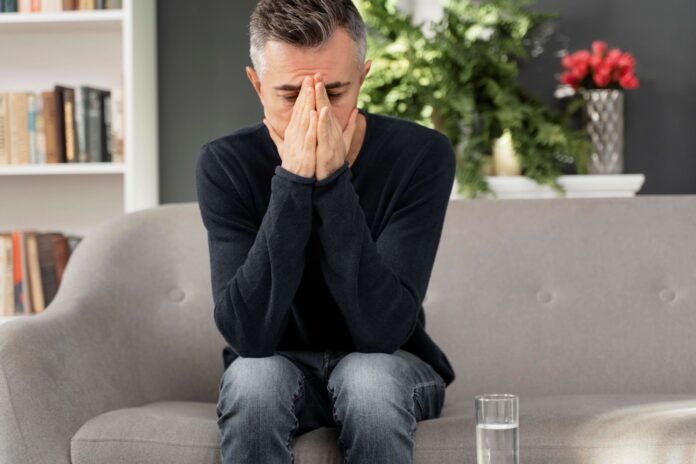You can do several things to help yourself deal with crippling anxiety. The first step is to understand its symptoms. Once you know why it happens, you can begin to treat it. You can also try putting together an “Anxiety Survival Kit” to help you cope with the situation. Then, you can work with a mental health professional to find an effective treatment plan.
Symptoms
Fortunately, there are treatment options for people suffering from crippling anxiety disorders. A therapist can help identify your disorder type and formulate an appropriate treatment plan. A doctor may recommend medication or talk therapy to treat anxiety symptoms. The most effective treatment for anxiety disorder will vary from person to person and may involve a combination of these approaches.
First, you should seek help. Identify your triggers. Keeping a diary is a great way to understand what triggers anxiety. Another good idea is to limit alcohol consumption. Social groups can also help calm your nerves and reduce unnecessary stress. It’s also a good idea to call friends and family to vent your feelings. You can also join support groups to cope with your anxiety.
Having crippling anxiety is a condition that can make everyday life nearly impossible. Often, these individuals experience insomnia and physical exhaustion. They may even experience social phobia and posttraumatic stress disorder. This condition can become dangerous over time if left untreated. If these symptoms persist, you should seek professional help.
Anxiety disorders often worsen over time, so seeking early help is crucial. Treatment for anxiety is much easier when it is diagnosed at an early stage. There are no known causes of anxiety disorder, but there are specific triggers that trigger it. Stressors, such as financial insecurity, relationships, and academic problems, can increase an individual’s susceptibility to anxiety. Additionally, anxiety symptoms can occur as parts of another disorder, such as depression or psychotic disorders.
Understanding the causes of anxiety disorder and how to treat it is essential. Anxiety is an illness that affects 40 million adults in the United States. It can severely disrupt your daily life, and less than 37 percent of sufferers get help. It isn’t shameful to seek help for an anxiety disorder. Learning more about the condition can help you find the treatment that will make it easier for you to live an everyday life again.
Generalized anxiety disorder (GAD) is one of the most common forms of mental illness. People with this condition feel paralyzed, have difficulty breathing, and suffer from intense physical symptoms. As a result, they avoid going out or making new friends. Their symptoms often include extreme feelings of fear.
While self-help techniques for anxiety disorders can help, it is essential to see a doctor for further evaluation. A doctor can identify an anxiety disorder by looking at any physical symptoms a person may be experiencing. In addition, a medical checkup can help rule out other medical conditions contributing to these symptoms.
The best way to deal with anxiety is to recognize the triggers and learn how to cope. If you know that stress can happen at any time, you can learn how to control your pressure by managing your symptoms. You can minimize your symptoms by practicing relaxation techniques like deep breathing and counting to 10. It’s also helpful to remember that you may have panic attacks if you’re a person with a panic disorder.
Causes
If you suffer from crippling anxiety, a few causes may contribute to your condition. First, you should make sure that you’re not overly stressed. If you feel nervous about social situations, for example, you may need to take some time to relax by practicing yoga or meditation. In addition, taking vitamins and magnesium may be helpful.
Another cause of crippling anxiety could be a physical illness. If you’re worried about your health, you should see your doctor. Your healthcare professional may prescribe medication or talk therapy to relieve your symptoms. You may also need to change your lifestyle. While this isn’t a cure, it can be managed.
Environmental factors can also contribute to crippling anxiety. Stress, chronic illness, or a loss of a loved one can all trigger debilitating anxiety. Fortunately, treatments can help you get through these stressful situations and enjoy your life more. By getting professional help, you can start living an everyday life once again.
Various mental illnesses, including generalized anxiety disorder, can cause crippling anxiety. These conditions can cause physical exhaustion and insomnia. Eventually, you may develop a panic disorder. In addition, people suffering from these conditions may also experience physical fatigue and other anxiety disorder symptoms.
People with a generalized anxiety disorder (GAD) often experience repeated episodes of extreme anxiety. During these attacks, they feel as though they are about to die. They have difficulty breathing, a rapid heartbeat, and excessive sweating. They may also experience racing thoughts and chest pain. They may also avoid social situations.
Other causes of crippling anxiety include posttraumatic stress disorder (PTSD), a condition in which the sufferer experiences chronic or traumatic events. Chronic illness and substance abuse are also contributing factors. Regardless of the cause, treatment is more effective early than later. If you’re suffering from anxiety, don’t wait until it becomes unbearable.
Another cause of crippling anxiety is excessive worrying about things you can’t control. This can have a profound impact on your overall well-being wellbeing. In severe cases, people with crippling anxiety often avoid situations. This can include physically avoiding something, declining social invitations, or not preparing for presentations. However, avoidance is not an effective cure. Instead, try implementing a series of steps to overcome your anxiety.
Getting enough sleep is essential. Sleep deprivation can worsen the symptoms of GAD. An adult needs seven to nine hours of sleep every night. You should consider seeing your doctor if you’re experiencing sleep deprivation due to your GAD symptoms. Your doctor may recommend medication to help with your condition.
Anxiety disorders are a severe problem that can affect your daily life and even lead to suicidal thoughts. Anxiety affects the mind, behavior, and physical well-being. The symptoms of anxiety range from mild to severe and can make life impossible. Some people may experience mild anxiety, which can help them make decisions and motivate them.
Treatment
If you are suffering from crippling anxiety, you need help to control it. This condition can cause you to avoid situations you might otherwise find threatening and weaken your ability to interact with the world. This condition may even prevent you from fulfilling basic needs. A healthcare professional can help you manage your symptoms by recommending various medications and lifestyle changes.
In addition to medication, treatments for crippling anxiety include exposure therapy, attention training, and a range of other techniques. These techniques can be learned on your own or from a trained professional. Treatment for crippling anxiety can also help you improve your quality of life and overcome distressing feelings.
Identifying your triggers can be the first step in treatment. Cognitive behavioral therapy aims to modify your thoughts and behavior patterns to cope with anxiety. Exposure therapy, which involves facing anxiety triggers in a controlled way, may be helpful for people suffering from GAD. In some cases, anti-anxiety medications are prescribed to help alleviate symptoms and prevent panic attacks.
Anxiety disorders can range from mild to severe. For severe cases, it is best to consult with a mental health professional who can help you diagnose the disease and work out a treatment plan. Though dealing with crippling anxiety is not easy, the proper treatment can help you overcome your condition and begin living an everyday life again.
Cognitive behavioral therapy is an increasingly popular method for treating anxiety. It involves teaching people how to change their thinking habits to alleviate symptoms and live a more fulfilled life. It may be used as an adjunctive treatment for medication or as a standalone approach to therapy. Cognitive behavioral therapy is particularly effective in dealing with anxiety because it involves learning to recognize negative thoughts and behaviors and change them.
The effects of this treatment may be gradual, but they can last for months or years. For those with specific fears, exposure therapy can be very effective. This involves gradually exposing someone to the feared object or event until they can deal with it. Another option is eye movement desensitization and reprocessing, which may initially seem strange. In this procedure, the person remembers a distressing event and moves their eyes in specific ways, which affects the brain’s processing of the information.
In addition to psychotherapy, psychologists also prescribe medications that may help alleviate the symptoms of crippling anxiety. Cognitive-behavioral therapy is the most successful type of therapy for treating anxiety disorders. It helps patients identify the factors that trigger anxiety and helps them develop healthier coping skills. During cognitive-behavioral therapy, patients are gradually exposed to situations they previously avoided because of fear. This therapy also helps people develop the confidence they need to deal with their anxiety and cope.
Some people take benzodiazepines or beta blockers to treat their crippling anxiety. These medications work by increasing serotonin levels in the brain. However, these medications can also cause an increase in blood pressure. This is why discussing your options with your doctor before choosing any medication for yourself is necessary.




